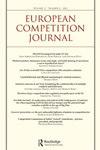The abstract presumption of harm in the Damages Directive: overconcern of overcompensation
Q2 Social Sciences
引用次数: 1
Abstract
ABSTRACT This paper is focussed on the implementation of the presumption of harm for cartels, as formulated in art. 17.2 of Directive 2014/104/EU. In most Member States the overcharge is presumed to be 0% unless proven otherwise. In two Member States this is 10% and in one it is 20%. These can be considered as three defaults. Damages litigation may lead to under- or overcompensation. Achieving full compensation is rather a coincidence. If harm is de facto substantially lower (higher) than the default, the infringer (victim) has an incentive to prove the actual level of harm. Different choices regarding the presumptions of harm imply a difference in the weighing of under- and overcompensation. A 0% default suggests that preventing overcompensation is the dominant goal. A 10% default will be more effective than a 0% default in serving the compensatory function.损害赔偿指令中的抽象损害推定:过度赔偿
摘要本文主要探讨了损害推定对卡特尔的实施。指令2014/104/EU的17.2。在大多数成员国,除非另有证明,否则假定超额收费为0%。两个会员国为10%,一个为20%。这些可以被视为三种默认值。损害赔偿诉讼可能导致赔偿不足或过多。实现全额补偿是相当巧合的。如果损害事实上大大低于(或高于)违约,侵权人(受害者)就有证明实际损害程度的动机。关于损害推定的不同选择意味着对补偿不足和补偿过度的不同权衡。0%的违约表明,防止过度补偿是主要目标。在服务补偿功能方面,10%的违约将比0%的违约更有效。
本文章由计算机程序翻译,如有差异,请以英文原文为准。
求助全文
约1分钟内获得全文
求助全文
来源期刊

European Competition Journal
Social Sciences-Law
CiteScore
1.50
自引率
0.00%
发文量
12
期刊介绍:
The European Competition Journal publishes outstanding scholarly articles relating to European competition law and economics. Its mission is to help foster learning and debate about how European competition law and policy can continue to develop in an economically rational way. Articles published in the Journal are subject to rigorous peer review by leading experts from around Europe. Topics include: -Vertical and Conglomerate Mergers -Enlargement of the Union - the ramifications for Competition Policy -Unilateral and Coordinated Effects in Merger Control -Modernisation of European Competition law -Cartels and Leniency.
 求助内容:
求助内容: 应助结果提醒方式:
应助结果提醒方式:


